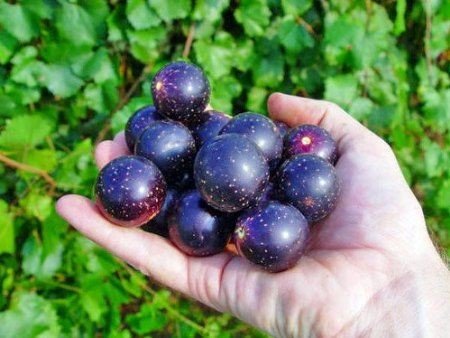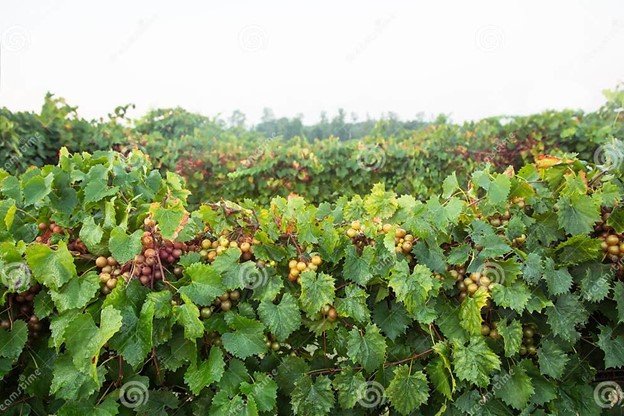
Can a grape that is native to North America prove to be a beauty secret? Can a humble grape help with a better complexion, stronger bones, teeth and more? A not so common red wine makes for younger looking skin, healthier hair, and stronger bones. The health benefits of muscadine grapes have been known for centuries, but only recently have the grapes been a focus with a scientific approach. Here are some interesting facts on the positive effects of muscadine grapes on our health.

The Grapes Origin
Muscadine is a grapevine native to the southern part of North America that has been grown domestically since the 16th century. Native American’s were eating the vines for far longer than that. The Muscadine grows naturally at a latitude in the Eastern USA from about West Virginia and Delaware all the way through the southern states as far west as Texas.
Muscadine and Scuppernong
Muscadine and Scuppernong grapes are indigenous to the Southeast region of the U.S. They grow both wild and domestically in backyards and on farms from Arkansas to the Carolina’s and everywhere South of there. Muscadine and Scuppernong are names that are sometimes used loosely to mean the same grape, but a Scuppernong is a particular variety of Muscadine. So, technically you could call any Scuppernong grape a Muscadine, but you couldn’t call any Muscadine grape a Scuppernong. Over the decades Muscadines have been domesticated and grafted into varying sizes and colors.
Anti-inflammatory properties
Muscadine grapes contain copious amounts of resveratrol, which is an anti-inflammatory compound that helps reduce inflammation in the body. Inflammation has been linked to chronic diseases such as heart disease, cancer, and diabetes. By reducing inflammation, muscadine grape consumption can help reduce the risk of these diseases. Resveratrol has also been shown to improve cardiovascular health by reducing blood pressure and improving blood vessel function. Additionally, resveratrol may help protect against Alzheimer's disease and dementia by preventing the formation of amyloid plaques in the brain.

Skin health
In addition to their anti-inflammatory properties, muscadine grapes contain antioxidants that help fight free radicals and protect the skin from damage. Free radicals can damage skin cells and lead to premature aging and wrinkles. Antioxidants help neutralize free radicals and promote healthy skin cells. Studies have shown that drinking a glass of muscadine grape juice daily can help improve skin tone and reduce the appearance of fine lines and wrinkles. Additionally, the antioxidants in muscadine grapes can help protect the skin against sun damage and prevent skin cancer.
Stronger bones and teeth
Muscadine grapes are high in calcium, magnesium, and other minerals that are essential for bone health. Calcium is essential for maintaining strong bones and teeth and preventing osteoporosis. Magnesium is also important for bone health because it helps regulate calcium absorption in the body. Studies have shown that regular consumption of muscadine grapes can help prevent bone loss and improve bone density in postmenopausal women. Additionally, the antioxidants in muscadine grapes may help protect against bone damage caused by oxidative stress and inflammation.
Healthier hair
Muscadine grapes contain a compound called polyphenols, which seem to promote hair growth and prevent hair loss. polyphenols help to reduce inflammation in the scalp and improve blood flow to the hair follicles. This promotes healthy hair growth and prevents hair loss caused by inflammation and poor circulation. Additionally, the antioxidants in muscadine grapes can help protect the scalp against damage caused by free radicals and UV rays, which can lead to premature aging of the scalp and gray hairs.

I was in contact awhile back with the people at Spiriterra Vineyards that produced Muscadine wine from their vineyard in Napa.
Spiriterra was a small family run producer based in the hills of the Vaca Mountain Range – with vineyards above Lake Hennessey. Paul and Shirley Dean took a trip to California to specifically watch the “Big Game” between Stanford and Cal Berkeley (their daughter Ashley was at Stanford at the time). During their visit they drove up to the Napa Valley to do some wine tasting when Paul happened to glance at one of the real estate magazines sitting outside one of the grocery stores.
Paul called up one of the agents who introduced him to this a hillside property and by the end of that week the Dean’s had purchased 52 hillside acres. They uprooted themselves from their long-time home in Connecticut and moved to the Napa Valley. Several acres of Cabernet Sauvignon were planted on site at the time of their purchase – and for many years they sold the fruit until 2009 when they held back all of this variety and made their first Cabernet wine. Paul grew up on a farm in the small town of Eatonton and one of the late summer traditions he remembered was eating Muscadine grapes – both the bronze-colored cultivated ones as well as the purple ones growing in the wild. In 2009 he decided to see how Muscadine grows on hillsides in the Napa Valley because he wanted to have fresh grapes of this variety that he could simply enjoy eating straight from the vine. He planted about 20 vines, was pleased with the results and then planted several blocks entirely to several clones of this variety.
After visiting Napa wineries and producers over the years, a variety such as this growing in the Napa Valley immediately caught my attention. It is an intriguing variety for several reasons but especially so when no one else is growing it here! Paul purchased all the cuttings from is Muscadine vines from a nursery in Georgia. These grapes grew on their own rootstock and are highly resistant to pests. They did not spray for pests or spray sulfur – for nearly 20 years they have never had a problem with frost on their property during the growing season. They were located at an elevation of 700-800 feet above sea level.
This is not a “normal” variety of grape planted in Napa. These grapes are the size of table grapes and often much larger. Muscadine has a surprising diversity of flavor depending on the ripeness of each individual grape. At times they taste like plum or have flavor characteristics much like that of a concord grape and others that are extremely ripe almost have a jammy quality. The skin is very thick, chewy and contains plenty of flavor and is rich in polyphenols and other nutrients. In any case, these are extremely flavorful grapes and are highly addictive.
The Grapes Origin
Muscadine is a grapevine native to the southern part of North America that has been grown domestically since the 16th century. Native American’s were eating the vines for far longer than that. The Muscadine grows naturally at a latitude in the Eastern USA from about West Virginia and Delaware all the way through the southern states as far west as Texas.
In conclusion, muscadine grapes offer numerous health benefits due to their high antioxidant content and other beneficial compounds such as resveratrol and polyphenols. By reducing inflammation in the body and promoting healthy skin and hair growth, these grapes can help improve overall health and well-being. So next time you are at the grocery store or farmer's market, be sure to pick up some muscadine grapes and enjoy the many health benefits of this delicious fruit! The fact is that it is not that easy depending on where one lives. I learned a few years ago that the vineyard had been sold.
When the idea of Muscadine grapes resurfaced I decided to order several bottles of alcoholic and non-alcoholic wines from Woodmill Winery in North Carolina (difficult to find in California) to try them for myself. Now I know this is no guarantee that my teeth, hair, and skin are in for a surprising result! Still, I will enjoy the experiment and hope to share more about Muscadine the Amazing Grape as I continue to explore.
Images courtesy of:Dreamtime.com

